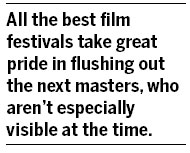Good or great?
Updated: 2012-06-01 09:35
By Liu Wei (China Daily)
|
|||||||||||
Comment
The presence of such stars as James Cameron and a three-hour red-carpet ceremony generated great fanfare at the second annual Beijing International Film Festival (BJIFF).
And film circles are rumbling about how BJIFF is reportedly applying for accreditation from the International Federation of Film Producers Associations (FIAPF). It would become the 15th competitive feature film festival certified by the organization.
While FIAPF didn't respond to an e-mail inquiry by press time, Beijing's ambition to become a new center of the global film industry is apparent.
Beijing has congenital advantages in attracting those eager to approach the market - foremost of which is that it's the capital of the country that's the world's fastest-growing film market.
BJIFF, which is hosted by the local government and the State Administration of Radio, TV and Film, is looking to capitalize on this competitive edge.
But the question arises: Could these advantages and the FIAPF's accreditation guarantee a truly great film festival?
The world's most celebrated film festivals, such as those in Cannes, Venice and Berlin, share some basic characteristics.

They are orderly and organized by professionals, who both understand and love film. This provides filmmakers, traders, media and ordinary filmgoers easy access to information and the services they need through efficient platforms.
But, most importantly, a film festival's core value is films. All the best film festivals take great pride in flushing out the next masters, who aren't especially visible at the time.
When Steven Soderbergh's Sex, Lies, and Videotape won the Palme d'Or - Cannes' top award - in 1989, he was only 26, and the film was his directorial debut.
Quentin Tarantino won the same award for Pulp Fiction in 1994, when he was a video rental store employee-turned director who had completed only one work.
And don't forget Zhang Yimou and Chen Kaige - two of China's most famous directors. Both rose to prominence by winning top awards at eminent festivals, such as the Berlinnale and Cannes.
These award winners' achievements later in their careers have proven juries' professionalism and discernment.
Some festivals have developed their own charisma.
Cannes, for example, is known for balancing art and commerce.
It maintains consistent support for art-house films.
At the Riviera, people see the year's bravest and most groundbreaking explorations of cinematic art and subjects.
Among all festivals, its film market section draws the most attendance by professional organizations and diversified titles.
Venice has been innovative.
Marco Muller, who has been a director for eight years, introduced the concept of "surprise films" - competing pictures announced after the festival opens. He also initiated an award for 3D movies in 2009. The selection of competing films is edgier and braver but raises public awareness of new talent.
Some small festivals - accredited by FIAPF or not - win over certain groups.
For example, Sundance is where people try to divine the next Oscar-winning independent films, such as Little Miss Sunshine. The Edinburgh Film Festival features a relaxing atmosphere, where film lovers lie in beanbags and eat homemade cakes.
Compared to them, Beijing has a long way to go.
BJIFF's organization is hardly orderly. It lacks proficient programming, catalogues and interview arrangements.
This year's screening schedule wasn't available until the last minute. Ticket purchases were troublesome. And there is no competition section.
So, it's too early to talk about the discovery of potential masterpieces.
An immediate question is: With the more-established Shanghai and Hong Kong film festivals so close on the calendar, how can Beijing attract quality films for its competition section?
Last, but not least, Beijing has not carved out a clear identity.
Will BJIFF be known as a film screening, a market or a competition? What's its unique hook for filmmakers, distributors, buyers and media?
No doubt the red carpet was stunning, the opening ceremony grand, and the cast of A-listers and industry moguls prominent.
But will issues concerning film itself be properly dealt with?
If so, FIAPF accreditation will be a natural consequence, sooner or later.
If not, it won't even win credibility among serious filmmakers and lovers.
Contact the writer at liuw@chinadaily.com.cn.
Related Stories
Minority artists to present arts festival 2012-05-18 13:45
Lu Chuan attends 1st Int'l Micro Film Festival' launch ceremony 2012-05-17 19:35
Chinese veteran artists attend 1st Int' Micro Film Festival' 2012-05-17 19:09
Micro-film blue paper released 2012-05-17 10:35
Cannes festival opens with quirky comedy 2012-05-17 09:38
Center protects film, TV 2012-05-16 17:25
Today's Top News
Rescuers race against time for quake victims
Telecom workers restore links
Coal mine blast kills 18 in Jilin
Intl scholarship puts China on the map
More bird flu patients discharged
Gold loses sheen, but still a safe bet
US 'turns blind eye to human rights'
Telecom workers restore links
Hot Topics
Lunar probe , China growth forecasts, Emission rules get tougher, China seen through 'colored lens', International board,
Editor's Picks

|

|

|

|

|

|





